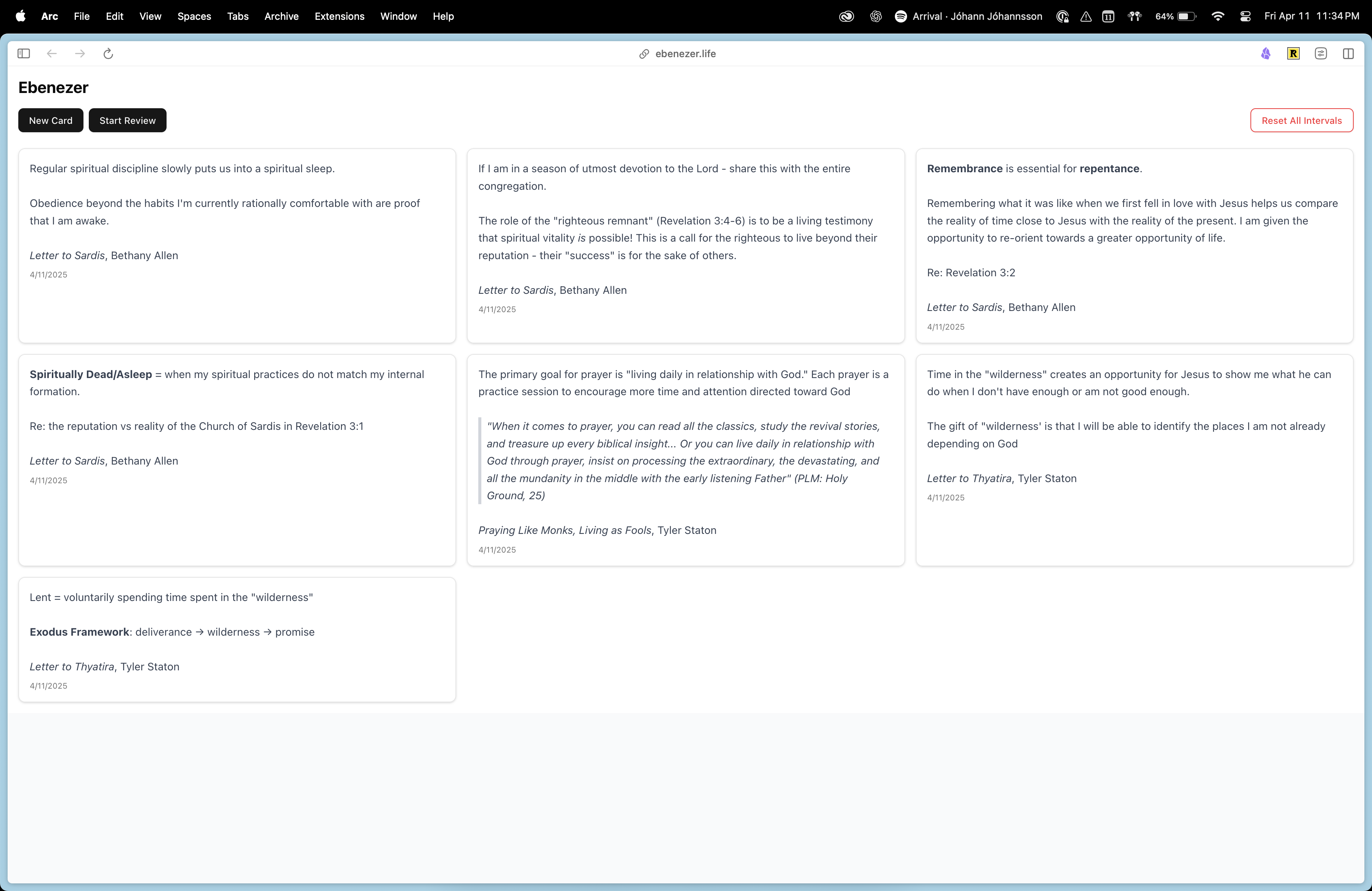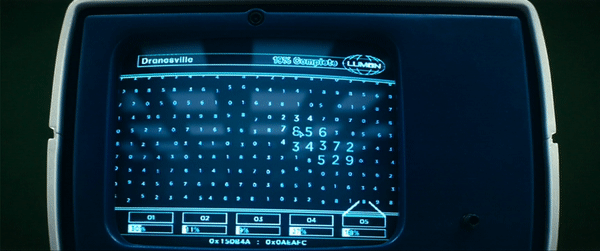Ebenezer - 2025 W15
Week 1 of Ebenezer in the books. We’ve set sail with this small app –

It’s not pretty (“Create Next App” is still the website title 🫣), but you’ve got to push off the dock before the wind starts hitting the sails.
What is Ebenezer going to be at the end of this journey? I’m not sure. But the vision is clear - better remember what God has spoken to me.
Remembrance
Over the past few years, I’ve been fascinated by how people learn and retain things. So much energy and content is made about new productivity methods and the latest brain hacks, but I’ve yet to find ways to implement this learning theory in my relationship with God.
Let me be clear, I’m not after magic with Ebenezer; I don’t think a digital tool is capable of opening another “level of spirituality” or bringing me into closer intimacy with Jesus. However, I see remembrance as a spiritual practice - something where I have a calling to participate in my spiritual formation. In the same way that the practice of reading scripture requires me to pick up the Bible and read it, or the practice of sabbath requires me to set and comply with boundaries for work, remembrance is something that I must put effort into in order to be formed into the likeness of Jesus.
I claim revelations from God as the most important things on my mind, yet I fail to recall them easily. On the contrary, it’s easy for me to rattle off Fantasy Football waiver wire picks that your uncle doesn’t know about, the hot goss regarding AI developments, random facts about running, or storylines from movies and television shows. What I am able to subconsciously recall informs how I operate in the present, so I need to put a concerted effort into remembering what God has spoken to me, since there are a lot of other voices I hear throughout the day.
👉 Remembrance is the core focus of Ebenezer.
Captain’s Log
I’m starting this Captain’s log to document Ebenezer’s journey. We’re starting with a learning tool to practice remembrance, but like the Ship of Theseus, Ebenezer’s form will continue to change the further into the sea we voyage.
The idea here is that as those changes take place, I’ll be able to document where we’re we’re at, clearly identify the challenges we’re facing, and articulate how we’re staying accountable to the vision. Of course there will be times when I steer Ebenezer off-track, but in writing these logs, I hope to soberly compare the difference between reality and intention to adjust orientation going forward. Along the way, I also look forward to share personal musings, express fears, and celebrate milestones.
This week, I’m feeling uncertain yet excited. I’ve found that it’s always that way at the start of something meaningful. There’s a vast ocean ahead.
Progress Updates
This week, I researched, brainstormed, and built a prototype.
Research
Most of my time was spent reading content about spaced repetition, memory systems, and tools for thought. Again, I’m not after magic here; I’m building off modern learning theory, not trying to build something novel on the cognitive science front.
I audited tools that are working with similar goals - Readwise, Anki, Mochi.
I also went on my first rabbit hole and researched church staff relational dynamics. That was way off course 🤦♂️. More on this below.
Thinking
I’ve been spending most of my thinking time trying to figure out what the core atomic entity of Ebenezer should be. How do I codify that which God has spoken to me.
This looked like a lot of brain dump writing, diagrams, etc. I don’t have an answer yet.
Prototyping
Sometimes back-to-back thinking sessions without an answer feels like banging your head against the same wall over and over. I fill pages of diagrams in my notebook to rethink the problem to no avail. When that happens, I like to prototype a quick solution to see the types of data I naturally want to store and the ways I intuitively interact (or want to interact) with a prototype. This was key to moving forward this week instead of being stuck in brainstorm mush.
I started by trying really hard not to build my own tool. I hacked together a Mochi Cards deck and Readwise themed review with things I’ve been learning recently. Both no build solutions were frustrating due to the heavy translation and manual work needed to get a baseline workflow going for our use case. Just like other tools for thought, Ebenezer needs to be closely aligned with how people intuitively think about what God speaks to them.
So I rolled up my sleeves, opened Windsurf, and in a few hours, the current flashcard-esque iteration of Ebenezer was born.
It was through these prototypes that I realized a few things:
- The character length of things I want to remember are quite short (tweet-ish in length). Remembrance is not about the ability to recite the transcript for an entire sermon. When I open Ebenezer, I want heavy-hitting, bite-sized reminders to chew on for the rest of the day.
- Not everything I note down while listening to a sermon or reading a theology book or journaling about my day are things I wanted to include in Ebenezer.
- Ebenezer gives me a practical reason to review my sermon notes. Once I process them into Ebenezer, they’ll be re-surfaced again instead of being hidden away in a random database.
Decisions
There are so many decisions to make at onset - too many to outline. But the ones I wanted to get firm about early were constraints. Without constraint, any decision makes sense, and I want to continuously hone focus to reduce the likelihood of getting lost at sea.
Ebenezer IS NOT any of the following:
- A daily devo app: Ebenezer should not replace existing personal rhythms of spending time with God. Ebenezer is not an app to be present with God and receive new insights; I do not think God is found in apps. Ebenezer is a learning tool - taking a similar weight and role in my life as a flash card app or Duolingo would.
- A generated content app: Ebenezer will not generate and push content to people that they have not input themselves. God has already spoken to me by the time I am reaching for Ebenezer. It is just a way for me to combat my forgetfulness and remember what has already been spoken. There will be no AI projecting what God is saying or a preacher that pushes doctrine. Ebenezer is as dumb as the stones it was named after. It only stores the meaning of the content ascribed to it - defined in partnership between God and me as a human.
- A daily journal or diary: Ebenezer is not a place to remember everything that happens in my life. God didn’t tell the Israelites to put up stones for anything that they came across. Ebenezer memories capture the subset of moments in which God has spoken to me. Daily journals can make me more self-aware and sensitive to what God may be doing in my life or speaking over me, but Ebenezer is not the place to work that out. Meditate with other platforms and tools and bring those insights to Ebenezer to store and recall.
- A church staff HR tool: This week, I forayed down this rabbit hole. My mind wandered into figuring out how to make Ebenezer a viable business. One path I considered was making church staff’s the primary customers of the tool. I started asking questions like - how can collective remembrance bind staffs closer together and lead to a more connected church. Yuck. I don’t want to be building an HR bonding tool. And also yuck because it’s a lie - I don’t know if collective remembrance will actually do anything for a church culture. And also yuck because I don’t want to view churches as a cash cow to leach off of for my personal sustenance. I’ll have to figure out a viable way to sustain Ebenezer going forward, but the side quest for church ops is not it.
On the Horizon
2 Questions + 1 Hope
Question: What is “what God speaks to me?”
If there’s one thing I could make absolutely clear on this log, it’s that the sole reason for Ebenezer existing is to better remember what God has spoken to me.
But how do I define “what God has spoken to me?” What are the ways God speaks to us and how can I codify this into specific atomic abstractions to design Ebenezer off of.
Right now, it feels a lot like MDR at Lumon identify what counts as something God has spoken to me. There’s things that seem right to log into Ebenezer and things that definitely don’t feel right.

This is the thing that dominates my shower thoughts for Ebenezer. My initial hypothesis is that there are 3 categories that make up “what God has spoken to me” – testimonies, teaching, and personal revelation.
I think the best way to figure this out will be practical usage of the Ebenezer prototype. What types of things do I feel drawn to remember? It’s pretty ambiguous now, but I’m hoping more data will reveal patterns.
Question: What is the spiritual practice of remembrance?
I’ve been talking about “remembrance” throughout this log, but in all honesty, I’ve probably never heard anyone say that word in a sentence. In all the spiritual formation material I’ve worked through, remembrance is not something mentioned. Yet I am convinced this is a practice that is valuable and worth integrating in my life. If I practice re-surfacing quotes from C.S. Lewis, Derek Thompson, Paul Graham, and the random Substack writer I’ve never heard of – just so I can keep their ideas at the forefront of my mind, wouldn’t I put tenfold more effort into remembering what God has spoken to me.
I may be convicted, but the lack of widely known frameworks around remembrance make it difficult to know how remembrance connects with other spiritual practices. Where in the workflow of someone’s personal spirituality does remembrance sit?
My working framework for this is: experience (a life event or sitting through a sermon or reading a book) → reflection → remembrance → solidification and modification of insights
Ebenezer sits right at “remembrance” but needs to connect upstream with experience and reflection while also providing a feedback loop for further reflection to solidify insights.
I’ll be thinking more about integrations, particularly upstream, to make it easier to understand where Ebenezer, and remembrance at-large, fits in my personal spiritual formation tools-for-thought stack.
Hope: Learning About Learning
Let’s not act like I’m a cog sci phd of learning theory. I generated a basic SRS algorithm with Claude 3.7 - I’m a literal dummy on this topic. I’m looking forward to connecting with people in this space who can teach me a lot more about learning than I could on my own. It’d be even cooler to meet someone who has already thinking about learning theory’s intersection with spiritual formation.